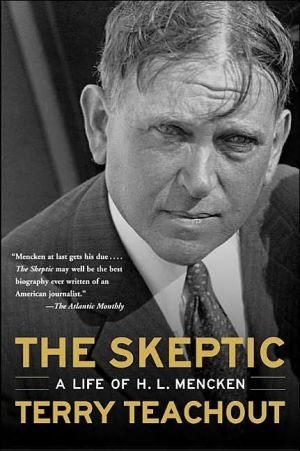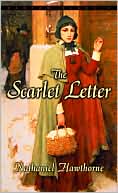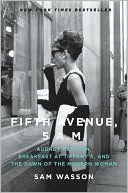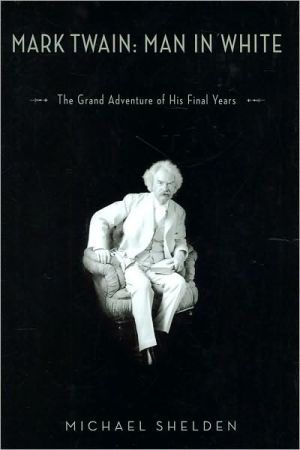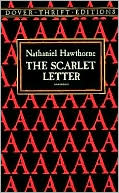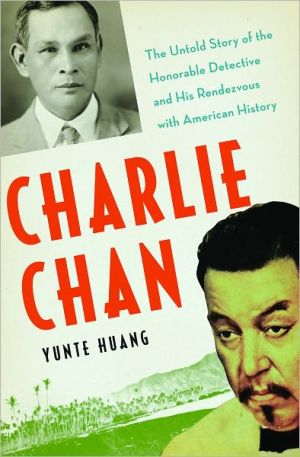The Skeptic: A Life of H.L. Mencken
When H. L. Mencken talked, everyone listened — like it or not. In the Roaring Twenties, he was the one critic who mattered, the champion of a generation of plain-speaking writers who redefined the American novel, and the ax-swinging scourge of the know-nothing, go-getting middle-class philistines whom he dubbed the "booboisie." Some loved him, others loathed him, but everybody read him. Now Terry Teachout takes on the man Edmund Wilson called "our greatest practicing literary journalist,"...
Search in google:
When H. L. Mencken talked, everyone listened — like it or not. In the Roaring Twenties, he was the one critic who mattered, the champion of a generation of plain-speaking writers who redefined the American novel, and the ax-swinging scourge of the know-nothing, go-getting middle-class philistines whom he dubbed the "booboisie." Some loved him, others loathed him, but everybody read him. Now Terry Teachout takes on the man Edmund Wilson called "our greatest practicing literary journalist," brilliantly capturing all of Mencken's energy and erudition, passion and paradoxes, in a masterful biography of this iconoclastic figure and the world he shaped.Book MagazineH.L. Mencken was the greatest gadfly American journalism has ever known. Author by his own estimate of 5 million words, he used many of them to attack biblical fundamentalists, Franklin Roosevelt and the credulous American public, which he christened "the booboisie." So raucous a figure rarely meets with biographical subtlety, but in BOOK contributor Teachout's superb and genial work, Mencken becomes more nuanced and self-contradictory, and because of it, more comprehensible. Teachout has the wisdom to notice what Mencken never seemed to, the odd contrast between his personal tranquillity and the public uproar he made in print: "He chipped away at the cornerstones of the culture that had made possible the bourgeois comfort in which he delighted." Except for the five years during which he was married, Mencken lived with his mother in the Baltimore house where he was born, writing ceaselessly using a staccato two-fingered typing process "that made him look like a bear cub imitating a drum majorette." Mencken is so colorful that any competent biographer could have produced a readable book merely by aping the vigor of his style. But Teachout, while brilliantly evoking Mencken, maintains his own sensibility and judgment. The result—generous but exact—is a work that deserves to be widely read.
\ From Barnes & NobleBarnes & Noble Discover Great New Writers\ In our media-saturated age, where countless pundits and commentators drone on endlessly, saying little, it's refreshing to rediscover H. L. Mencken, whose unique style, brilliant wit, and withering criticism made him one of America's most influential writers and thinkers during the first half of the 20th century. Terry Teachout's biography is an enormously well researched and engaging journey from Mencken's boyhood in Baltimore through his days as a cub reporter to his founding of The American Mercury (one of the most influential magazines of the 1920s) and his eventual fall from prominence. \ Best known for his lifelong association with The Baltimore Sun as an editor and columnist, Mencken was a critic with wide-ranging interests and no shortage of passionately held opinions (on FDR: "He had every quality that morons esteem in their heroes"). Mencken was equally comfortable (and caustic) writing about politics as he was in the realm of literature and the performing arts; and he helped introduce the American public to the likes of Joseph Conrad and Sinclair Lewis, as well as nurturing the early works of F. Scott Fitzgerald, William Faulkner, and Willa Cather.\ Teachout does a masterful job of putting Mencken's long career in the context of his times, including an unflinching analysis of Mencken's anti-Semitism and outspoken antipathy to American entry into World War II, as well as his controversial views on art and love. The Skeptic is a fascinating introduction to a contradictory figure who, in his day, was considered American's greatest journalist but who could never be called anything less than honest. (Winter 2002 Selection)\ \ \ \ \ \ Ken Auletta"Mencken has finally met a worthy biographer. Teachout is the kind of tour guide a first-rate biography requires."\ \ \ Paul Johnson"(Mencken’s) life is worth recounting and is here expertly and fairly summarized ... An important book."\ \ \ \ \ George F. Will"Many more people will discover the delights of Mencken’s work, thanks to Terry Teachout’s judicious but lively assessment."\ \ \ \ \ Sam Tanenhaus"Teachout has brought Mencken to life, in all his rich comic irascibility. The Skeptic is irresistible."\ \ \ \ \ Washington Post Book World"A balanced, judicious assessment, flecked with sharply critical insights."\ \ \ \ \ Washington Post Book World“A balanced, judicious assessment, flecked with sharply critical insights.”\ \ \ \ \ From The CriticsH.L. Mencken was the greatest gadfly American journalism has ever known. Author by his own estimate of 5 million words, he used many of them to attack biblical fundamentalists, Franklin Roosevelt and the credulous American public, which he christened "the booboisie." So raucous a figure rarely meets with biographical subtlety, but in BOOK contributor Teachout's superb and genial work, Mencken becomes more nuanced and self-contradictory, and because of it, more comprehensible. Teachout has the wisdom to notice what Mencken never seemed to, the odd contrast between his personal tranquillity and the public uproar he made in print: "He chipped away at the cornerstones of the culture that had made possible the bourgeois comfort in which he delighted." Except for the five years during which he was married, Mencken lived with his mother in the Baltimore house where he was born, writing ceaselessly using a staccato two-fingered typing process "that made him look like a bear cub imitating a drum majorette." Mencken is so colorful that any competent biographer could have produced a readable book merely by aping the vigor of his style. But Teachout, while brilliantly evoking Mencken, maintains his own sensibility and judgment. The result—generous but exact—is a work that deserves to be widely read. Author—Penelope Mesic\ \ \ \ \ Penelope MesicH.L. Mencken was the greatest gadfly American journalism has ever known. Author by his own estimate of 5 million words, he used many of them to attack biblical fundamentalists, Franklin Roosevelt and the credulous American public, which he christened "the booboisie." So raucous a figure rarely meets with biographical subtlety, but in BOOK contributor Teachout's superb and genial work, Mencken becomes more nuanced and self-contradictory, and because of it, more comprehensible. Teachout has the wisdom to notice what Mencken never seemed to, the odd contrast between his personal tranquillity and the public uproar he made in print: "He chipped away at the cornerstones of the culture that had made possible the bourgeois comfort in which he delighted." Except for the five years during which he was married, Mencken lived with his mother in the Baltimore house where he was born, writing ceaselessly using a staccato two-fingered typing process "that made him look like a bear cub imitating a drum majorette." Mencken is so colorful that any competent biographer could have produced a readable book merely by aping the vigor of his style. But Teachout, while brilliantly evoking Mencken, maintains his own sensibility and judgment. The result—generous but exact—is a work that deserves to be widely read.\ \ \ \ \ Publishers WeeklyThere is no lack of material on the curmudgeonly early-20th century journalist, and a devotee could spend years wading through Mencken's three-volume autobiography, two early biographies, and essays in the scholarly journal Menckeniana. However, Teachout simplifies the process for the casual reader, distilling the weight of information on Mencken into a tidy, fascinating biography that has much of the neat phrasing and sly wit that the rancorous writer displayed himself. Organized chronologically, the book follows the fat baby (Mencken noted that if cannibalism hadn't been abolished in his home state of Maryland, he'd have "butchered beautifully"), the teenage cub reporter, the editor and finally the memoirist. By drawing on published works and recently discovered private papers, Teachout puts the skeptic into context, giving as much insight into the Jazz Age as into the writer who hated jazz. Whether describing the quirks of novelist Theodore Dreiser, the rise of the pulp magazine, or the importance of the Scopes trial, the author brings deeper understanding to Mencken's passionate diatribes, and shows that the journalist was not just a product of his times, but a shaper of its attitudes. Although Teachout, a music critic for Commentary, obviously has an avid fascination for and admiration of the man who was determined to take on "braggarts and mountebanks, quacks and swindlers, fools and knaves," this is not a hagiography. He shows that Mencken could be both a fool and a knave, and even an occasional braggart. Yet he was always honest in his opinions, and Teachout's treatment of the material honors that journalistic impulse. Agents, Glen Hartley and Lynn Chu. (Nov.) Copyright 2002 Cahners Business Information.\ \ \ \ \ Library JournalTeachout, who discovered and edited A Second Mencken Chrestomathy, draws on the acidulous author's private papers to write this biography. Copyright 2002 Cahners Business Information.\ \ \ \ \ Kirkus ReviewsThe first full-scale biography in a generation of the great journalist, editor, and social critic (1880–1956), extending and in some ways supplanting the ones that have come before it. \ Time was when H.L. Mencken’s reporting was the standard against which other journalists measured their own work, with the result that American newspapers of the 1920s and ’30s were full of second- and third-rate imitators of the master. That time has long passed, but New York Times contributor Teachout (City Limits, 1991), editor of the 1995 anthology A Second Mencken Chrestomathy, finds plenty of reasons to suggest that a Mencken revival is long overdue. What thinking person, after all, can deny Mencken’s scathing assessment of the still ascendant "Puritan scheme of things, with its gross and nauseating hypocrisies, its idiotic theologies, its moral obsessions"? What student of contemporary politics would not find a sympathetic guide in a writer whose "sneers and objurations have been reserved exclusively for braggarts and mountebanks, quacks and swindlers, fools and knaves"? Good stuff, indeed, but, as Teachout bravely admits, there are as many reasons to condemn Mencken as to praise him. He subscribed all his life to a suburban brand of anti-Semitism, once describing a contributor to his American Mercury magazine, for instance, as "a Jew . . . of the better sort" and writing to an interviewer, "I don’t like religious Jews" (mind you, he added, "I don’t like religious Catholics and Protestants"). He overlooked the excesses of the Nazi regime until well into WWII, perhaps out of misguided loyalty to his German ancestors. Still, well-placed criticism aside, Teachout offers a portrait of Mencken thatemphasizes his extraordinary productivity—he wrote 19 books, thousands of articles, essays, and reviews, and perhaps 100,000 letters while covering national politics for daily newspapers and editing two magazines—and his contributions to journalism and American letters alike.\ A balanced portrait of the muckraking newsman, and an excursion into American intellectual history and journalism.\ \ \
